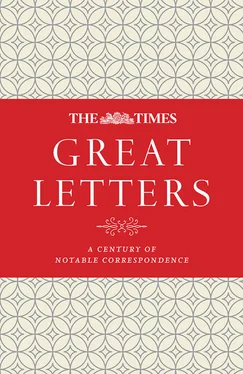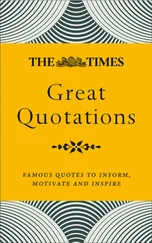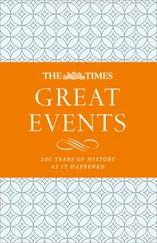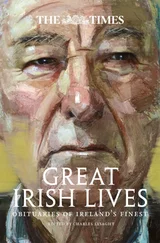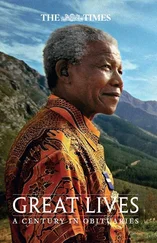* * * * * * *
In praise of bread
10 December 1928
Sir, Among the various ways in which agriculture is encouraged by the present Government of Italy is the institution of a yearly festival for the glorification of bread, with a hymn in its praise, to which Signor Mussolini has appended his name. The festival is held on April 13 and 14, and the “hymn” is one which surely no one but a countryman of St. Francis could have conceived. It is printed on cards which may be seen on many cottage walls in all parts of Italy. Below is a translation.
I am, Sir, yours very truly,
G.H. HALLAM
S. Antonio, Tivoli (Roma)
IN PRAISE OF BREAD
Italians!
Love Bread.
Heart of the home,
Perfume of the table,
Joy of the hearth.
Respect Bread,
Sweat of the brow,
Pride of labour,
Poem of sacrifice.
Honour Bread,
Glory of the fields,
Fragrance of the land,
Festival of life.
Do not waste Bread.
Wealth of your country,
The sweetest gift of God,
The most blessed reward of Human toil.
Mussolini
* * * * * * *
“Caddie!”
6 February 1929
Sir, This will never do! For five days in the week we avail ourselves of The Times as it so competently deals with the less important affairs of life: politics, domestic or foreign; the imminence, hopes, fears of a General Election; the arrivals or departures of great people; the steady depreciation of our scanty investments; another century or two by Hobbs; or a stupendous break by Smith. But on the sixth day The Times is exalted in our eyes; for then your “Golf Correspondent,” in a column of wisdom, humour, and unmatched literary charm, deals with the one real thing in life.
This week for the first time he has deeply shocked and disappointed us all. I am but a “rabbit.” I confess to a handicap of 24 (at times) and a compassionate heart (always). I cannot bear to see a fellow creature suffer, and it is for this reason among others that I rarely find myself able to inflict upon an opponent the anguish of defeat. To-day I suffer for a whole world of caddies, wounded in the house of their friend. They learn in a message almost sounding a note of disdain that the verb which signifies their full activity is “to carry.”
By what restriction of mind can anyone suppose that this is adequate?
Does not a caddy in truth take charge of our lives and control all our thoughts and actions while we are in his august company? He it is who comforts us in our time of sorrow, encourages us in moments of doubt, inspires us to that little added effort which, when crowned with rare success, brings a joy that nothing else can offer. It is he who with majestic gravity and indisputable authority hands to us the club that he thinks most fitted to our meagre power, as though it were not a rude mattock but indeed a royal sceptre. It is he who counsels us in time of crisis, urging that we should “run her up” or “loft her,” or “take a line a wee bit to the left, with a shade of slice.” Does he not enjoin us with magisterial right not to raise our head? Are we not most properly rebuked when our left knee sags, or our right elbow soars; or our body is too rigid while our eye goes roaming? Does he not count our strokes with remorseless and unpardonable accuracy, keeping all the while a watchful eye upon our opponent’s score?
Does he not speak of “our” honour, and is not his exhortation that “we” must win this hole? Does he not make us feel that some share of happiness, or of misery, will be his in our moment of victory or defeat? Does he not with most subtle but delicious flattery coax us to a belief that if only we had time to play a “bit oftener” we should reach the dignity of a single-figure handicap? Does he not hold aloft the flag as though it were indeed our standard, inspiring a reluctant ball at last to gain the hole? Does such a man do nothing but “carry” for us?
Of course, he does infinitely more. He “caddies” for us, bless him.
Yours,
BERKELEY MOYNIHAN
* * * * * * *
The Telephone Kiosk
22 May 1929
Sir, If this letter should meet the eye of the Postmaster-General, perhaps he will explain why he has christened the telephone box near the Royal Academy a telephone kiosk! It would not be easy to find a more ridiculous word.
Yours, etc.,
ALGERNON LAW
Replied on 23 May 1929
Sir, To Sir Algernon Law’s question anent the name “kiosk,” as applied to the street telephone box, the Postmaster-General could reply with official hauteur, as did Humpty Dumpty to Alice, “When I use a word it means just what I choose it to mean, neither more nor less.” Actually the word has travelled from Persia via France, gathering en route a veneer of Western civilization plus Post Office vermilion and shedding some of its Eastern trimmings, such as its veranda and balustrade. When the out-of-door telephone call station (open to the public day and night, Sundays and early-closing days) had to be given a name, “box” was already assigned to the first-born, the indoor public telephone. The resemblance to the Paris “kiosk” paper stall naturally suggested kiosk as the appropriate name.
Yours, etc.,
H. S. POWELL-JONES
Secretary, Telephone Development Association
Replied on 24 May 1929
Sir, Mr Powell-Jones seeks to defend the Postmaster-General for the adoption of this ridiculously inappropriate name for an out-of-door telephone station by the irrelevant argument that it is applied by Parisians to a newspaper-stall and that the word “box” had already been applied to the indoor public telephone. But “box” is not the only word in the English language. For instance, “stall” or “booth” or, better still, “hut.” We shall next have the General Post Office called the Yildiz Kiosk and the P.M.G. 1the Padishah.
Yours, etc.,
ALGERNON LAW
1The Postmaster-General
Replied on 25 May 1929
Sir, In voicing a horror of foreign word immigrants that one would scarcely expect from his distinguished career at the Foreign Office, Sir Algernon Law is hardly consistent. In his short letter he uses at least 13 words of foreign derivation which at some time must have been as alien as “kiosk” is to-day. He does not even boggle at “telephone,” though one might well fancy that with its Hellenic ancestry it would feel itself more at home in an Oriental kiosk than in a Nordic hut, booth, stall or byre. After all, does it matter greatly what we name their local habitation so long as we are provided with public call facilities on a more adequate scale?
Yours, etc.,
H. S. POWELL-JONES
Secretary, Telephone Development Association
* * * * * * *
When London was Noisy
23 September 1929
Sir, What is all this noise about noise? Only a few genuine antiques like myself remember what London was like when there were no quiet motor cars running on wood or asphalt pavements, and when all the traffic was drawn with iron tires running on either stone setts or macadam. If you want to know what the noise was like in those days you have to go to the docks or to one of those stone paved streets in a factory town and hear the horse-drawn lorries.
In spite of the motor-omnibuses which make most of the noise, you can talk going along Piccadilly. When I was a boy you could not, because the crashing of the hooves and the rattling of the iron tires made hearing impossible. And in those times on a wet day the windows of the shops in Bond Street were splashed waist-high with mud squirted out of the puddles by the air compressed by the hollow hooves of the horses. People have forgotten all those unpleasantnesses.
And the congestion in the streets was just about as bad. A hansom for two took up more room on the road than the biggest Rolls-Royce. And a pair-horse carriage cumbered the earth more than does a motor-omnibus. The old horse-omnibuses took up nearly as much room as a motor-lorry and trailer. The shouting of drivers and cracking of whips and whistling for cabs made far more noise than does the mild tooting of motor horns to-day. Let us thank Heaven that we are quit of those bad old times.
Читать дальше
